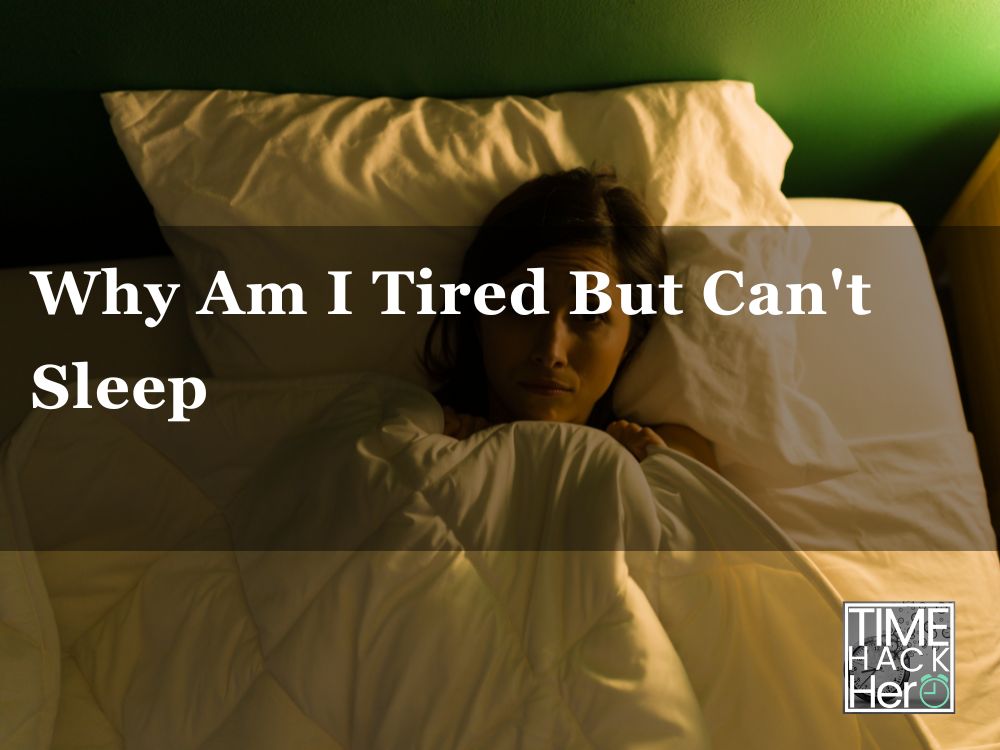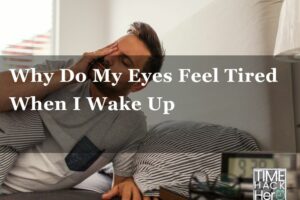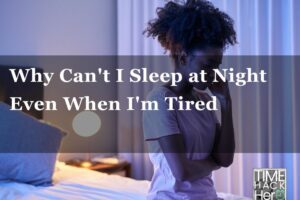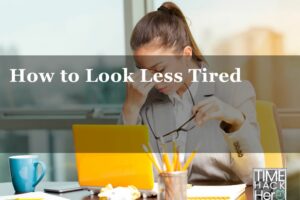You had a long, exhausting day and feel completely drained. Your bed is calling your name. But as soon as your head hits the pillow, your mind races and your body seems restless. You toss and turn for hours unable to wind down and fall asleep despite extreme fatigue.
This frustrating scenario is actually very common. This article explores the common reasons why many people struggle with inability to sleep when tired. It outlines the negative effects tossing and turning all night has on your mind and body. Finally, you’ll find suggestions for proven solutions to identify the root causes of your insomnia so you can finally get some rest.
Table of Contents
Is This Normal?
Occasionally having difficulty falling asleep after a stressful day or drinking coffee too late once in awhile is normal. But if you regularly:
- Take over 30 minutes to fall asleep most nights
- Frequently toss and turn despite being really tired
- Only sleep a few hours per night or have low quality sleep
This indicates an underlying issue possibly preventing you from getting adequate restorative sleep consistently. Determining the source will allow you to take action to optimize your sleep.
Common Causes of Inability to Sleep When Tired
Here are some of the most prevalent reasons you may struggle to sleep despite strong feelings of fatigue:
1. Stress and Anxiety
High levels of mental stress or worry often translate into sleep difficulties. When you feel overwhelmed emotionally, your nervous system remains on high alert. This activates your “fight or flight” response, making it excruciatingly difficult to relax and fall asleep.
Thoughts racing about responsibilities, conflicts, financial problems or other stressors prevent you from disengaging from conscious thought long enough to drift off. This stress-imposed insomnia keeps you awake even when your body desperately needs rest.
2. Consumption of Caffeine, Nicotine or Alcohol
Consuming stimulating substances like caffeine or nicotine close to bedtime disrupts your ability to fall asleep.
Caffeine in coffee, tea, soda and energy drinks is a strong anti-sleep compound. Caffeine’s stimulating effects can persist for several hours after consumption, preventing sleep onset when tired.
Nicotine is also a stimulant. Smoking too close to bed or experiencing nicotine cravings at night both undermine sleep.
While alcohol initially causes drowsiness through its sedative effects, as it metabolizes later in the night it actually awakens you. This prevents restful sleep and compounds fatigue.
3. Use of Electronic Devices Before Bed
Bright light exposure from the screens of phones, tablets, TVs and computers suppresses your body’s natural melatonin release. This secretion of melatonin is what signals your brain that it’s time to sleep. Light from devices tricks your brain into thinking it’s still daytime, making falling asleep challenging even when exhausted.
The mental stimulation and engagement from media content on devices also keeps your mind active rather than transitioning into a relaxed state for sleep.
4. Disruptive Sleep Environment
Aspects of your sleep environment like noise, light, uncomfortable temperatures, and poor bedding can all interfere with your ability to fall asleep when you otherwise feel tired.
Optimizing your sleep setting goes a long way. Consider blackout curtains, a white noise machine, a quality mattress, comfortable pillows and bedding, lowering the thermostat temperature, and eliminating disruptive noises.
5. Medications That Disrupt Sleep
Certain prescription medications are known to cause insomnia and sleep disruption as a side effect. These include steroids, stimulants for ADHD, beta blockers, SSRIs, and some diuretics.
Over-the-counter medications like certain antihistamines, nasal decongestants, pain relievers and diet pills contain stimulants that can impair sleep as well.
If your unexplained insomnia arose after starting a new medication, talk to your doctor about timing doses earlier, adjusting dosages or exploring alternate options without sleep-disrupting side effects. Don’t stop medications without medical guidance.
6. Irregular Sleep Schedules
Inconsistent sleep schedules from day to day disrupt your natural circadian rhythms that regulate feelings of sleepiness.
When your bed and wake-up times vary significantly between weekends, weekdays and daily, your biological clock gets confused. This makes it harder for sleep cues to kick in properly, even when you feel completely drained.
Try to keep bed and rise times within 1 hour of consistency, even on free days, to support quality sleep.
7. Underlying Health Conditions
Various medical issues can impose difficulty sleeping even when exhausted. These include:
- Chronic pain conditions
- Neurological disorders like Alzheimer’s or Parkinson’s
- Mental health issues like anxiety, depression or ADHD
- Respiratory disorders like sleep apnea or asthma
- Gastroesophageal reflux disease (GERD)
- Hyperthyroidism
- Restless leg syndrome
- Urinary problems like enlarged prostate
See your physician if an untreated health condition could be perpetuating your inability to sleep when tired. Treating the medical issue may resolve associated insomnia.
8. Poor Sleep Habits
Certain unhealthy sleep practices undermine your ability to fall asleep promptly when tired. Examples include:
- Spending excessive time awake in bed watching TV, eating, reading or using your phone. Time in bed should be reserved just for sleep.
- Excessive napping or napping late in the day – this reduces your homeostatic sleep drive at night.
- Exposure to bright light before bed – dim lighting cues winding down.
- Eating a heavy meal too close to bedtime – this can cause indigestion.
- A pre-bed routine lacking transition activities to relax your mind for sleep.
Adjusting these sleep hygiene factors makes it easier to quickly drift off when your body craves rest.
Take an honest inventory of your lifestyle and health to determine what needs to change for quality sleep to come easier when you feel fatigued.
Health Risks of Insufficient Sleep
The inability to fall asleep when exhausted night after night accumulates into substantial sleep deprivation over time. Not getting adequate sleep negatively impacts nearly every aspect of your health:
- Impaired concentration, productivity, memory, learning and cognition
- Increased risk for accidents and errors
- Compromised immune function and frequent sickness
- Weight gain and increased risk for obesity, diabetes, and heart disease
- Impaired motor coordination and reflexes
- Mood disturbances like irritability, depression and anxiety
- Increased inflammation and oxidative stress
- Higher risk for dementia, stroke, heart disease, and premature death
Resolving any issues standing in the way of much needed rest is critical for protecting both your physical and mental wellbeing.
How to Fix Inability to Sleep When Exhausted
If you regularly find yourself tossing and turning despite exhaustion, implement the following strategies:
See Your Doctor
Discuss your symptoms with your doctor to identify if any underlying conditions may be causing your insomnia, like sleep apnea, acid reflux, or depression. Treating medical issues can improve sleep.
Optimize Sleep Environment
Ensure your sleep haven is cool, quiet, and 100% dark. Use blackout curtains, a white noise machine, and switch to a comfortable mattress. Reserve bedrooms for sleeping only.
Improve Sleep Hygiene
Stick to consistent sleep and wake times, limit daytime naps to 30 minutes, avoid screens before bed, establish a calming pre-bed routine, and go to bed when sleepy rather than overtired.
Relaxation Techniques
Wind down by practicing deep breathing, meditation, gentle yoga, or gratitude journaling before bed to calm the mind, reduce anxiety, and prime your body for sleep.
Limit Caffeine and Alcohol
Avoid caffeine for 6-8 hours and alcohol 2-3 hours before bed, as these can negatively impact sleep quality and continuity.
With targeted lifestyle changes and medical guidance if an underlying condition is suspected, you can troubleshoot the barriers keeping you from achieving that elusive, wonderful deep sleep your body craves.
Frequently Asked Questions
1. Why can’t I sleep at night even when extremely tired?
The most common reasons include underlying stress/anxiety keeping the mind active, environmental factors like noise/light/pets waking you, evening caffeine intake, inconsistent sleep routine, electronics use before bed, and untreated sleep disorders like insomnia or sleep apnea.
2. How long can you go without sleep when fatigued?
Though lack of sleep is unhealthy for anyone, most adults can only go 1-3 days without sleep before cognition, coordination, and function are impaired. Microsleeps, irritability, sluggish reactions, and mental fog set in after just 24 hours without sleep when tired.
3. Should I still try to sleep if it’s not happening?
It’s better to get out of bed and engage in a quiet, relaxing activity after 20-30 minutes of unsuccessful sleep, rather than continue tossing and turning frustrated. However avoid screens, as blue light inhibits melatonin. Return to bed when drowsy again.
4. Could my medication be causing inability to sleep when tired?
Yes, many common prescriptions like steroids, beta blockers, stimulants for ADHD, certain antidepressants, and some diuretics and hypertension meds list insomnia as a side effect. Check with your doctor about alternative medications or optimal timing of dosage if this is suspected.
5. Are there any supplements to help sleep when overtired?
Some natural supplements like melatonin, valerian root, magnesium, and chamomile can be options, but always discuss trying new supplements with your doctor first. Proper sleep hygiene should be addressed as well.
Conclusion
In summary, being completely exhausted but unable to fall asleep is extremely frustrating but often solvable. Identify any medical, environmental, timing, or substance use factors impairing quality sleep. Improve your sleep hygiene through targeting lifestyle habits within your control. With determination, you can get the restorative sleep your body craves.









